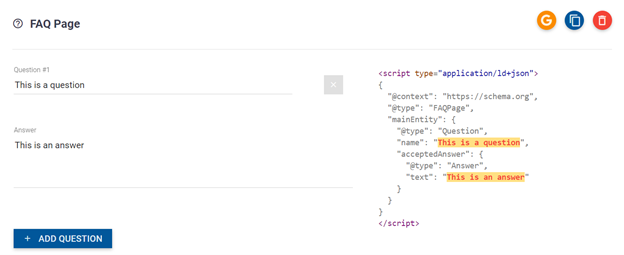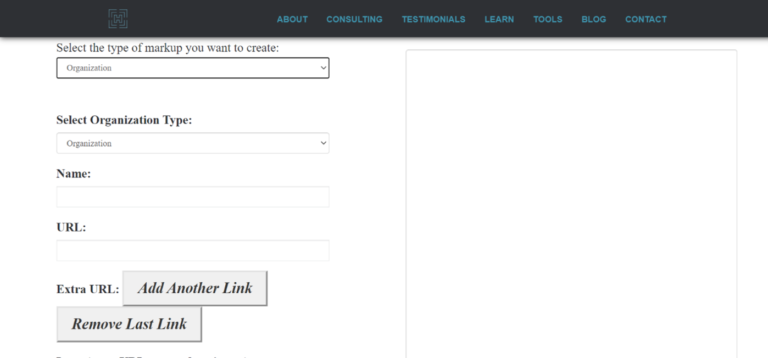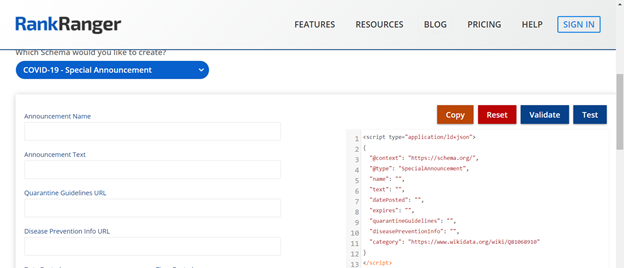Creating and managing structured data can be challenging and time-consuming.
One simple error in your JSON code can prevent your structured data from validating in Google’s Structured Data Tool.
At the same time, structured data (or schema) helps Google better understand your content as it seeks to provide the best results to searchers based on their intent.
That’s why these rich results can help your content stand out and capture more clicks, impressions, etc.
Luckily, there are platforms and tools that can help with creating, managing, and keeping up to date with the latest changes in structured data.
Check out my seven favorite tools below, listed in no particular order.
1. Schema App
This is the most comprehensive tool out there, hands down.
Schema App is my go-to tool when I want to execute, test, manage, and keep up to date with changes and updates in structured data.
They have an awesome library of information that helps with identifying schema.org types and connecting data, popular types, and properties, etc.
Personally, I think Schema App gives you too much information, which can be a bit overwhelming at times.
However, it is still the best schema resource and management tool out there.
One of the many things I love about Schema App is that they have a way to define structured data with Wiki.
For example, if I want to optimize product pages on the Build-A-Bear website, I can type in [build-a-bear] and they automatically find the Wiki entry to define your structured data; in this case, https://en.wikipedia.org/wiki/Build-A-Bear_Workshop.
Advertisement
Continue Reading Below
Another great feature is that it’s the most comprehensive tool for finding all structured data types.
Schema App also has recommended and required fields to show which attributes you must have in order to show up as rich results, in addition to good reporting, a data highlighter, etc.
Advertisement
Continue Reading Below
2. Merkle Structured Data Tool
When I need to quickly generate some basic structured data such as organization or FAQs, Merkle’s structured data tool is ideal.
You can quickly find basic structured data types and generate schema for breadcrumb, event, how-to, or job posting, to name a few.
Then you can test it, copy it, and add it to your site.
The only drawback to this tool is it only lists basic structure types and does not have any comprehensive structured data, vocabularies, glossaries, etc.,
Still, it’s a great tool.

3. Hall Analysis
This tool, like Merkle’s, can quickly generate structured data but is limited to only local business, person, product, event, organization, and website.
Advertisement
Continue Reading Below
Not only that, but you must also copy and paste the code into Google’s structured data tool and test it to make sure it works.

Merkle’s, on the other hand, gives you the ability to test it right there and offers more structured data types.
Advertisement
Continue Reading Below
4. The RankRanger Structured Data Tool
RankRanger offers a good variety of structured data types to test, including COVID-19 special announcements (which I have not seen in any other tools).

It also allows you to copy, reset, validate, and test your structured data.
Advertisement
Continue Reading Below
5. The Chrome Structured Data Plugin
This is a must-have if you want to see if structured data is present on the page as you browse different websites for auditing, research, etc.
From the plugin, you can test in Google, see if there are any errors or warnings, copy the data in the table, and more.
6. Google’s Structured Data Testing Tool
Now that we have covered my favorite tools to create, manage, and execute structured data, let us discuss the best ways to test structured data.
Advertisement
Continue Reading Below
In 2020, Google announced its structured data tool was being deprecated.
This caused an uproar in the SEO community.
I have some good news for you. The Structured Data Testing Tool is not going anywhere—it’s moving to Schema.org by April 2021.
The Structured Data Tool is the best tool to test structured data and see what warnings and errors the tool finds for your code.
Simply either enter a URL or copy and paste your code into it.
SEO professionals love this tool because it enables you to check syntax and make sure it validates according to Schema.org standards.
7. Google’s Rich Results Tool
This is a good tool to see whether your page will support rich results by entering a URL or code.
Advertisement
Continue Reading Below
What I like about this is that it offers the option to test with Google smartphone or Googlebot desktop and will then tell you if your webpage is eligible for rich results.
Google’s Rich Results Tool and Structured Data Tools should be used together to show if your page is eligible for rich results and if your code has any errors or warnings.

Pro Tip: The biggest difference between the Google Structured Data Testing Tool and the Rich Results Tool is that the latter is only able to test approved classes of structured data that will directly influence the appearance of search results.
Advertisement
Continue Reading Below
The Structured Data Tool can validate all structured data types.
Not all structured data types are eligible for rich snippets.
How Structured Data Tools Support Your SEO Efforts
Having structured data can really help your site stand out in the SERPs.
It can drive business results, increase findability, optimize for voice search, help you get into the Knowledge Panel, and much more.
The right tools and technology are essential for creating clean code that validates in Google’s Structured Data Testing Tool and Rich Results Test.
In addition to keeping up with all of the changes and new structured data types, you get actionable reporting, maintenance tips, and resources that will help your structured data strategy become an ultimate success and meet your key performance indicators.
Advertisement
Continue Reading Below
More Resources:
Image Credits
All screenshots taken by author, February 2021




